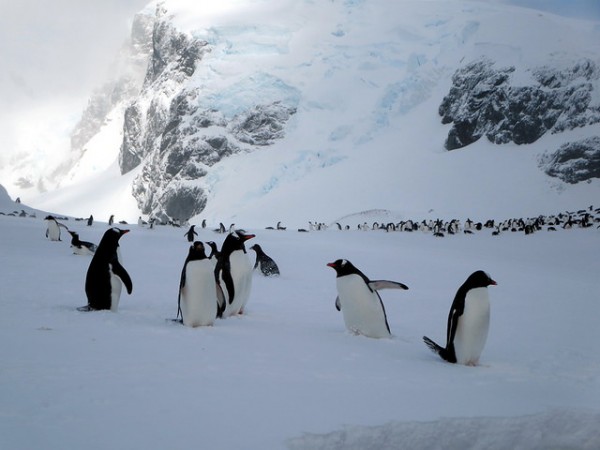By Ana Verayo, | April 12, 2017

A large gentoo penguin colony is found on Cuverville Island just off the Antarctic Peninsula. (David Stanley/CC BY 2.0)
Scientists have discovered ancient lake sediments made of penguin poop in an island across the Antarctic, revealing that a special penguin species was able to survive repeated volcano eruptions in Deception Island. A gentoo penguin population is found in Ardley Island in the Antarctic Peninsula which is also home to a massive volcano.
Like Us on Facebook
This gentoo penguin colony is also the largest one in Antarctica composed of almost 6,000 breeding pairs of penguins. These penguins have experienced a violent past involving volcanic eruptions that threatened the population with extinction.
In a new study, scientists were able to obtain lake sediments in Ardley Island that consisted of fossilized penguin poop dating as far back as 6,700 years ago. Climate records from these lake sediments are aged at 8,500 years old. Over thousands of years, these sediments became trapped with ash erupting from Deception Island's volcano.
Researchers say that dark bands from lake sediment cores indicate volcanic eruptions and larger bands reveal ash falling from more massive eruptions. These thicker sections also reveal biological markers of penguin poo or guano, indicating a growing population of the birds throughout the island's history.
According to the author of the study, Stephen Roberts from the UK Natural Environment Research Council, these records reveal that after three of the biggest volcanic eruptions in Deception Island, there was an immediate decline of guano. There was a very rapid decline of guano followed by a slow recovery of the penguins.
Scientists say that it can take around 400 years for gentoo populations to recover from massive volcano eruptions. More specifically, ash falling from Deception Island can cover the entire ground and can make it extremely hard for penguins to breed, nest, and live there.
A majority of penguin populations died after these dangerous events, but some groups subsisted on the island or escaped to a nearby land mass to survive until the island recovers from an eruption. These eruptions did not wipe out all the gentoo populations, showing that the species is resilient to natural disasters.
"After the biggest eruption some 5,300 years ago, evidence shows that the penguins did struggle for a while in low population numbers. It might take a long time to bounce back but the gentoo penguins still live on the island today," Robert added.
This new study was published in the journal Nature Communications.
-
Use of Coronavirus Pandemic Drones Raises Privacy Concerns: Drones Spread Fear, Local Officials Say

-
Coronavirus Hampers The Delivery Of Lockheed Martin F-35 Stealth Fighters For 2020

-
Instagram Speeds Up Plans to Add Account Memorialization Feature Due to COVID-19 Deaths

-
NASA: Perseverance Plans to Bring 'Mars Rock' to Earth in 2031

-
600 Dead And 3,000 In The Hospital as Iranians Believed Drinking High-Concentrations of Alcohol Can Cure The Coronavirus

-
600 Dead And 3,000 In The Hospital as Iranians Believed Drinking High-Concentrations of Alcohol Can Cure The Coronavirus

-
COVID-19: Doctors, Nurses Use Virtual Reality to Learn New Skills in Treating Coronavirus Patients







